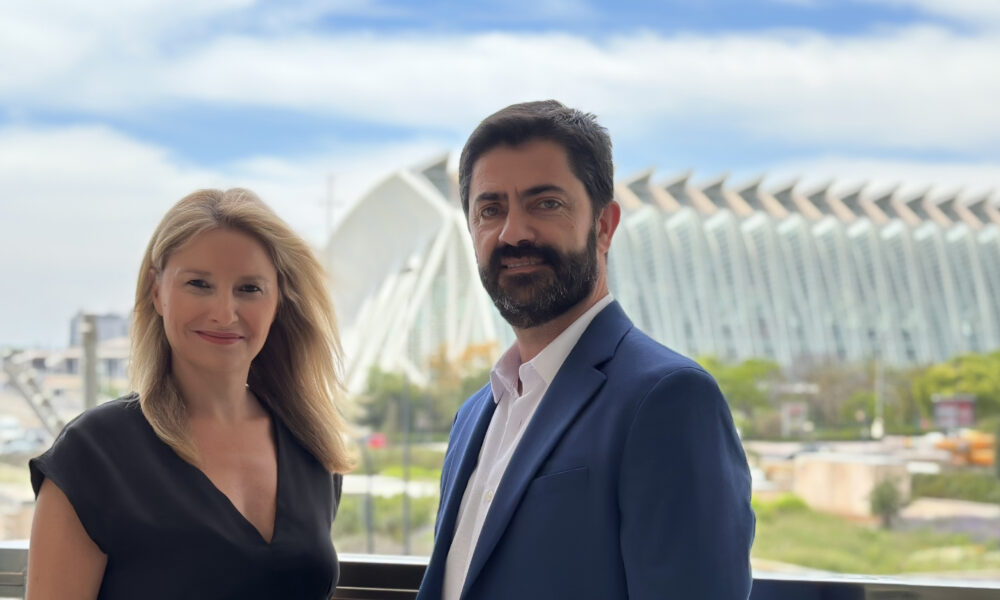Advice & Insights
NextTier Ventures to Make a Notable Presence at AI Day in Valencia with General Partner Ruben Colomer
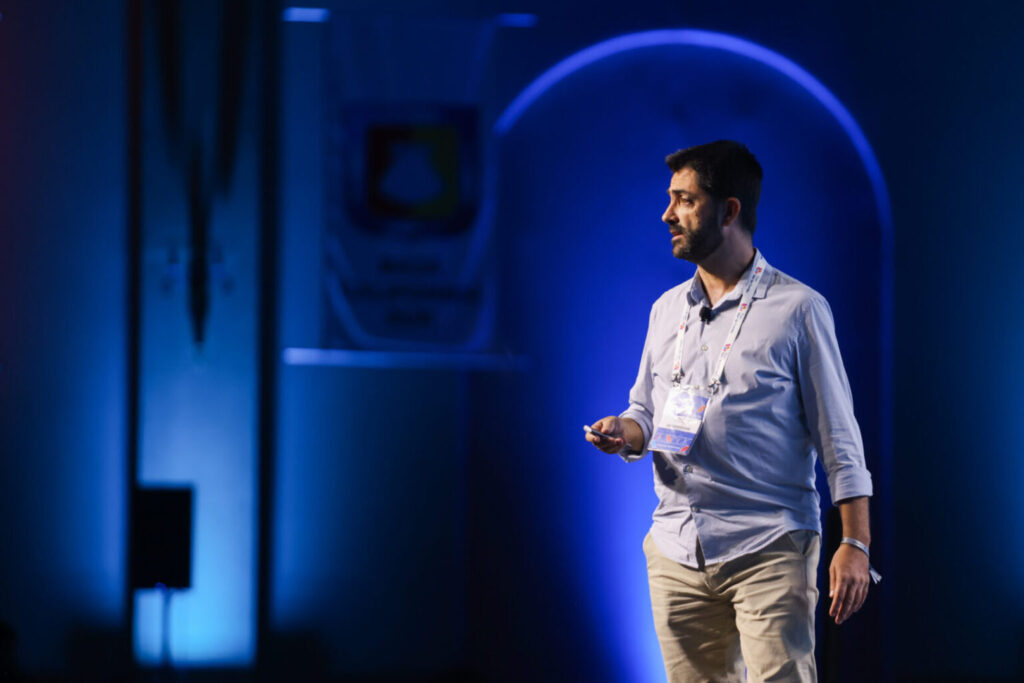
Ruben Colomer, our General Partner, will participate in a roundtable discussion on AI at the upcoming AI Day in Valencia. This event, focusing on the real-world applications and strategies of artificial intelligence, is scheduled for Wednesday, November 29, 2023, from 09:30 to 13:30. It will be held at Las Naves, located at Carrer de Joan Verdeguer, 16, 46024 Valencia.
AI Day is an important gathering for professionals and enthusiasts in the field, showcasing how companies are leveraging AI to enhance competitiveness and innovation. The event promises insightful discussions and networking opportunities, including a mix of presentations and panels with experts in the field.
In addition to Ruben Colomer’s participation in the AI roundtable, the event features a diverse lineup of speakers and topics, emphasizing the impact and future of AI in various sectors. It’s an ideal platform for learning about the latest trends and advancements in artificial intelligence.
The event, organized by TICforyou, is part of the larger Valencia Digital Summit and is supported by key local institutions, reflecting the growing importance of AI in the region’s technological and business landscape
Ruben Colomer, our General Partner, concludes the Mar de Cortes Forum with a presentation on AI.
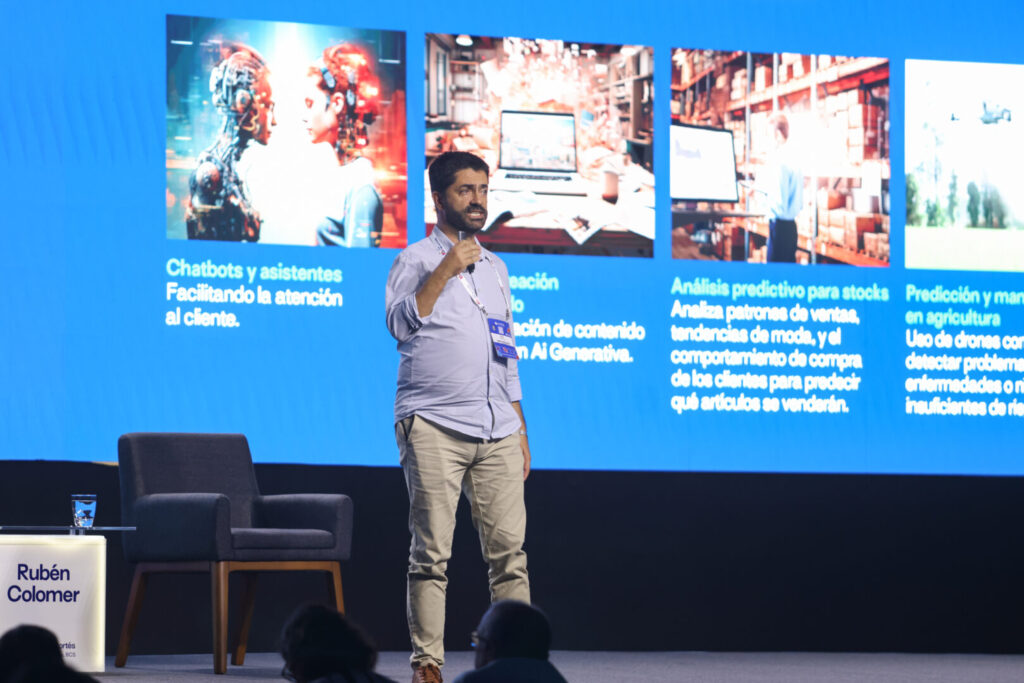
«Companies that do not adapt to this revolution will face multiple risks and will be at a competitive disadvantage in an increasingly innovative market».
Los Cabos, BCS. November 10, 2023. Artificial intelligence is going to change our lives, from personal to business, and it will revolutionize all sectors, offering opportunities to learn, innovate and grow, said Rubén Colomer Flos.
During his presentation of the conference ‘Application of Artificial Intelligence in the Real World’ at the Summit 2023 Prosperity: A Possible Purpose, organized by the Sea of Cortez Forum, the co-founder and partner of Next Tier Ventures emphasized the importance of understanding its potential and how we can take advantage of it.
‘Artificial intelligence is not only a technological marvel, it is an economic driving force with investments already amounting to trillions worldwide. Artificial intelligence is revolutionizing the way we do business, increase productivity, and create new markets and units,’ he stressed.
A Future That Has Already Arrived Colomer Flos indicated that artificial intelligence is showing an annual growth of 50% year over year and it is expected that by 2030 the market for generative artificial intelligence will reach one trillion US dollars.
‘Artificial intelligence has ceased to be a simple trend and has become an essential tool for competitiveness. Companies that understand its potential will be at the forefront in their respective markets,’ he assured.
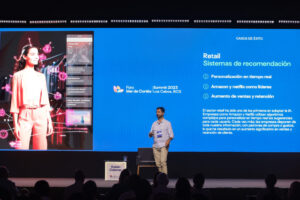 The expert reflected that when the Internet arrived the change was radical, but artificial intelligence will be much more revolutionary, and therefore, organizations that proactively adopt these tools and their applications will be better positioned for the future.
The expert reflected that when the Internet arrived the change was radical, but artificial intelligence will be much more revolutionary, and therefore, organizations that proactively adopt these tools and their applications will be better positioned for the future.
‘It is an opportunity to learn, innovate, grow, and respond to the changing demands of the market. The artificial intelligence revolution is already here, it’s time to invest, adapt, and learn. Don’t wait for the wave of change to overwhelm you. It’s time to act and be part of this new era,’ he warned.
AI opens up opportunities for companies to learn, innovate and grow: Rubén Colomer. Adapt or Deal with the Consequences The Spanish speaker predicted that companies that do not know how to adapt artificial intelligence will face multiple risks, from losing market share to more innovative competitors to a reduction in operational efficiency due to lack of automation and optimization.
This resistance to change will lead to a perception of obsolescence, resulting in a loss of relevance in an increasingly competitive, dynamic, and technology-oriented market, he said.
During his presentation, Colomer Flos described examples of the use that is already being made of artificial intelligence in different sectors, as well as the risks and fears in the face of these new tools.»
Patricia Pastor, our General Partner, recently participated in the II Forum on Artificial Intelligence in Alicante
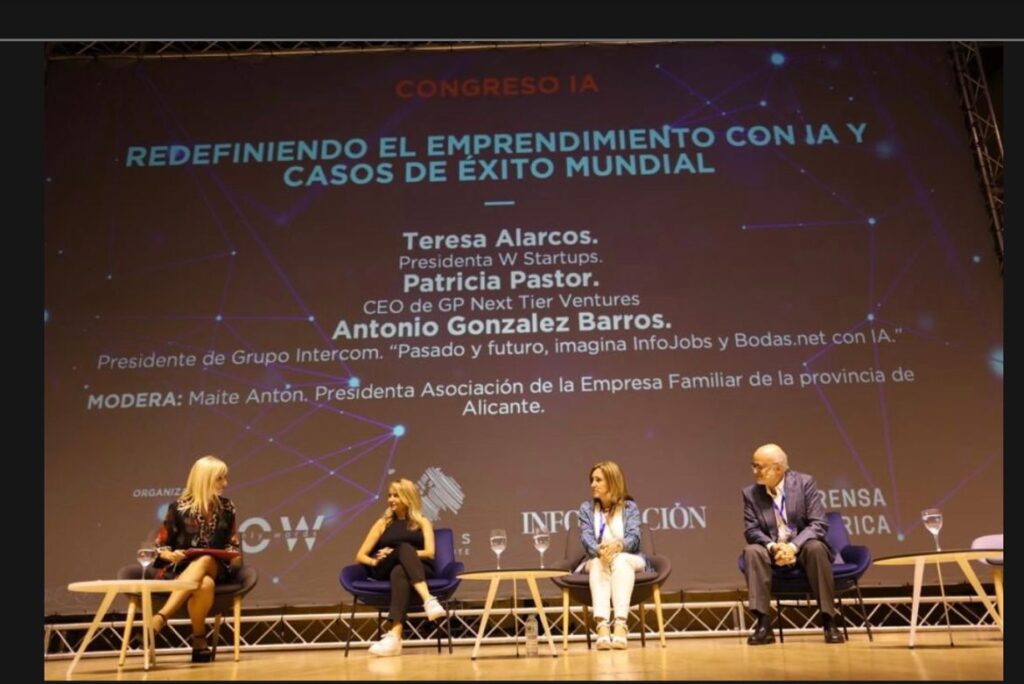
«Patricia Pastor, our General Partner, recently participated in the II Forum on Artificial Intelligence at Encuentros NOW. In our discussion on how hashtag#AI is redefining entrepreneurship, we highlighted several key points:
- The United States’ investment of 140 billion dollars for research in AI.
- The investment in AI in Spain, growing by more than 30%, achieving a turnover of 57.4 billion euros.
- The incredible transformation happening in education, the increase in cybersecurity, and the significant environmental challenge posed by AI.»
NextTier Ventures Embarks on Insightful Journey to Miami: Embracing the ‘Always Open Funding Round’ Mindset

NextTier Ventures recently concluded their #MissionMiami, imparting a crucial lesson to startups: the importance of an ‘always open’ funding round, a key aspect of the American #mindset. This approach underlines that investment opportunities can arise unexpectedly and from various sources, not just traditional VCs. These could be potential clients, fellow startup founders, and others.
In a world marked by uncertainty, startups need to be prepared for all outcomes. Financial stability is crucial to withstand the highs and lows of business cycles. A notable example shared during our trip was that of Ryan Petersen, founder of Flexport, who controversially raised $1 billion despite not being in dire need of funds, right before the pandemic hit.
Another interesting takeaway was the use of investment instruments like the #Safe, popular in the U.S. but less known in Spain. Humberto Pertuz of Vozy, speaking at an event in Miami, highlighted this difference to our participating startups, emphasizing the need to adapt to such evolving funding strategies.
‘Not being in a funding round is no longer an option’ was a key message, emphasizing the need for constant readiness to seize financial opportunities, a lesson NextTier Ventures brings back from Miami.»
Next Tier Ventures Launches to Invest in Artificial Intelligence Startups
Next Tier Ventures will focus its activity on artificial intelligence startups in Europe, the USA, and Latin America and is led by Patricia Pastor and Ruben Colomer.
Based in Valencia and Miami, Next Tier Ventures’ potential is to help startups be born global from the outset, building a strategic bridge between the two cities to facilitate the growth of their startups.
Both General Managers are well-known for their career in the tech scene. With many projects created and invested in, and as initiators of the first ecosystems created in Spain, this time they have decided to come together and fully commit to the technology that will change everything – artificial intelligence. «We have always liked to ride the upcoming wave, and we have already surfed quite a few, but this one will deeply impact our lifestyle, our economy; it will be a paradigm shift, and this commitment is to live it from its beginnings, which gives us an advantage,» says Patricia Pastor, founder and GP of Next Tier Ventures.
The data confirms it: in 2022, global private investment in artificial intelligence reached $136.5 billion, and since May of last year, only 5 of the companies sold exceeded 25 billion. Artificial intelligence is a significant long-term investment opportunity, as it has the potential to transform entire industries. All sectors will be affected by advances in this field.
«After 5 years of investing in Artificial Intelligence, and seeing the emerging generative AI startups, we realize that the impact will be as significant as the Internet in the 90s, and we want to be part of this new future,» says Rubén Colomer, co-founder and GP of Next Tier Ventures.
-Next Tier Club-
Another differentiating but innovative part of Next Tier Ventures is its new Club. Its members are part of an exclusive portfolio that gives you access to business trips, access to a powerful global network of investors and advisors. Its partners include founders and professionals from the entrepreneurial, technological, and investment ecosystem with headquarters in Valencia, Miami, Mexico City, Bogotá, Buenos Aires, San Francisco, New York, and Miami. Joining Patricia Pastor and Ruben Colomer is an experienced team such as Diego Moya; serial entrepreneur with two exits, investor and co-founder of the first Blockchain Hub in Spain, Fernando Óñiga, investor and entrepreneur both organizers of Misión Miami, and on the international side with prestigious professionals, entrepreneurs, lawyers, and investors like Javier Capucci and Federico Vázquez.
Next Tier Club is undoubtedly a new concept in this environment that provides a unique meeting space for the growth of startups at an international level.
Nace Next Tier Ventures para invertir en startups de Inteligencia Artificial
Next Tier Ventures centrará su actividad en startups de inteligencia artificial en Europa, Usa y Latinoamérica y está liderado por Patricia Pastor y Ruben Colomer.
Con base en Valencia y Miami, el potencial de Next Tier Ventures es ayudar a que las startups nazcan globales desde el primer momento, construyendo un puente estratégico entre las dos ciudades para facilitar el crecimiento de sus startups.
De sobra es conocida la trayectoria de ambos General Managers en la escena tecnológica. Con muchos proyectos creados e invertidos a sus espaldas y siendo iniciadores de los primeros ecosistemas que se crearon en España, esta vez han decidido juntarse y apostar de lleno por la tecnología que lo va a cambiar todo, la inteligencia artificial. – “ Siempre nos ha gustado subirnos a la ola que viene y ya llevamos surfeadas unas cuantas pero esta va a impactar profundamente en nuestro estilo de vida, en nuestra economía, va a ser un cambio de paradigma y esta apuesta es para vivirlo desde sus inicios, lo que nos da una ventaja” – comenta Patricia Pastor fundadora y GP de Next Tier Ventures.
Los datos lo confirman: en 2022, la inversión privada mundial en inteligencia artificial alcanzó los $136.5 mil millones, y desde mayo del año pasado, solo 5 de las empresas vendidas superaron los 25 mil millones. La inteligencia artificial es una gran oportunidad de inversión a largo plazo, puesto que tiene potencial para transformar industrias enteras. Todos los sectores se van a ver afectados por los avances en este campo.
“Tras 5 años invirtiendo en Inteligencia Artificial, y al ver las nuevas startups de IA generativa emergentes, nos damos cuenta que el impacto será tan grande como el de Internet en los 90, queremos formar parte de este nuevo futuro” – señala Rubén Colomer co-fundador y GP de Next Tier Ventures.
-Next Tier Club-
Otra parte diferencial pero muy novedosa de Next Tier Ventures es su nuevo Club. Sus miembros forman parte de un exclusivo portfolio, viajes de negocios, una potente red de inversores y de advisors a los que acceden a escala global. Sus partners lo conforman fundadores y profesionales del ecosistema emprendedor, tecnológico e inversor con sedes en Valencia, Miami, Ciudad de México, Bogotá, Buenos Aires, San Francisco, Nueva York y Miami. Junto a Patricia Pastor y Ruben Colomer se suma un equipo experimentado como Diego Moya; emprendedor en serie con dos exits, inversor y cofundador del primer Hub de Blockchain en España, Fernando Óñiga, inversor y empresario ambos organizadores de Misión Miami y en la parte internacional con profesionales de prestigio, empresarios, abogados e inversores como Javier Capucci y Federico Vázquez.
Next Tier Club es sin duda un nuevo concepto en este entorno que procura un espacio de encuentro único para el crecimiento de las startups a nivel internacional.
The Three Types of Artificial Intelligence: ANI, AGI, and ASI — Discovering the World of AI 🤖🧠
Artificial intelligence (AI) is transforming our daily lives and the business world. But, did you know that there are three different types of AI? I’ll try to explain the differences between Narrow Artificial Intelligence (ANI), General Artificial Intelligence (AGI), and Superintelligent Artificial Intelligence (ASI), and we’ll look at some examples of each.

ANI (Narrow AI): The AI we experience in our daily lives is classified as ANI. These machines focus on specific tasks and have limited abilities. Some examples of ANI include:
- Virtual assistants like Siri or Alexa, which help us organize our lives and answer our questions.
- Recommendation systems on shopping websites or music apps, which suggest products or songs based on our preferences.
- Voice recognition and text-to-speech software, which facilitates communication and accessibility.
AGI (General AI): AGI is a concept of artificial intelligence that has the ability to understand and learn any intellectual task that a human can perform. Although we have not yet managed to develop an AGI, some examples of what it might look like include:
- Autonomous robots capable of performing multiple tasks and adapting to different environments, such as Sonny the robot from the movie “I, Robot.”
- Medical diagnostic systems that can analyze symptoms and patient data to identify and treat diseases more efficiently than human doctors.
ASI (Superintelligent AI): ASI is a theoretical concept that refers to an artificial intelligence much more advanced than the human mind in every possible aspect. Although it does not yet exist, an ASI could include abilities such as:
- Solving global problems and challenges, such as climate change and economic inequality.
- Developing technologies and scientific discoveries unimaginable to us today.
- Being able to have emotions and relationships, taking human-machine interaction to a whole new level.
AI is advancing rapidly and has great potential to change our lives and the way we work. By understanding the different types of AI, we can better appreciate their possibilities and limitations, and prepare for a future in which intelligent machines will become increasingly common. 🚀🌐
#ArtificialIntelligence #AI #ANI #AGI #ASI #Technology #Innovation
Massive Language Models (MLM)
Massive Language Models (MLM) like GPT have made a significant impact in the field of natural language processing (NLP). Tools such as ChatGPT utilize these models to generate coherent and contextually relevant responses. These models are trained on large volumes of data and are then fine-tuned on specific datasets to improve their performance in particular tasks.

Training an MLM involves challenges and limitations. These include training time, which can be extremely lengthy as the dataset size increases; computational cost, as high-performance GPUs or TPUs are required; and data quality, which needs to be as clean and consistent as possible.
Furthermore, they face the issue of diminishing returns, where adding more data does not result in significant improvements in the model’s performance. It is also crucial to address bias and ensure fairness in models, as training data can contain biases and prejudices inherent in human language.
To obtain good training data, it is essential to consider aspects such as diversity of sources (books, articles, websites), representativeness of different subject areas and language styles, and inclusion of multiple languages and localizations. Data quality is vital, as well as balance and equity in data distribution across different categories and topics.
Data labeling is important for fine-tuning in specific tasks. Clear and consistent labeling criteria are needed, and, if possible, multiple annotations per data instance should be obtained. It is also crucial to address privacy and security concerns, removing or anonymizing personally identifiable information (PII) and complying with privacy and data protection regulations.
By addressing these challenges and limitations, MLMs can be adapted to specific applications and use cases, improving their relevance and accuracy in different contexts, resulting in more useful and effective models for a wide variety of NLP tasks.

